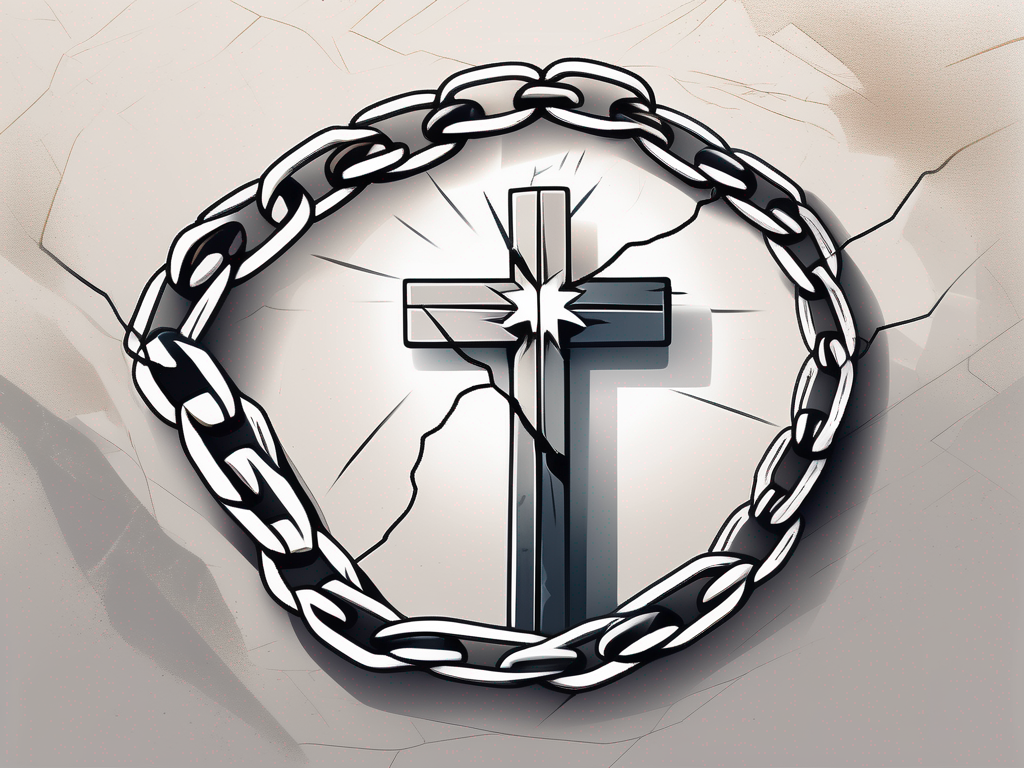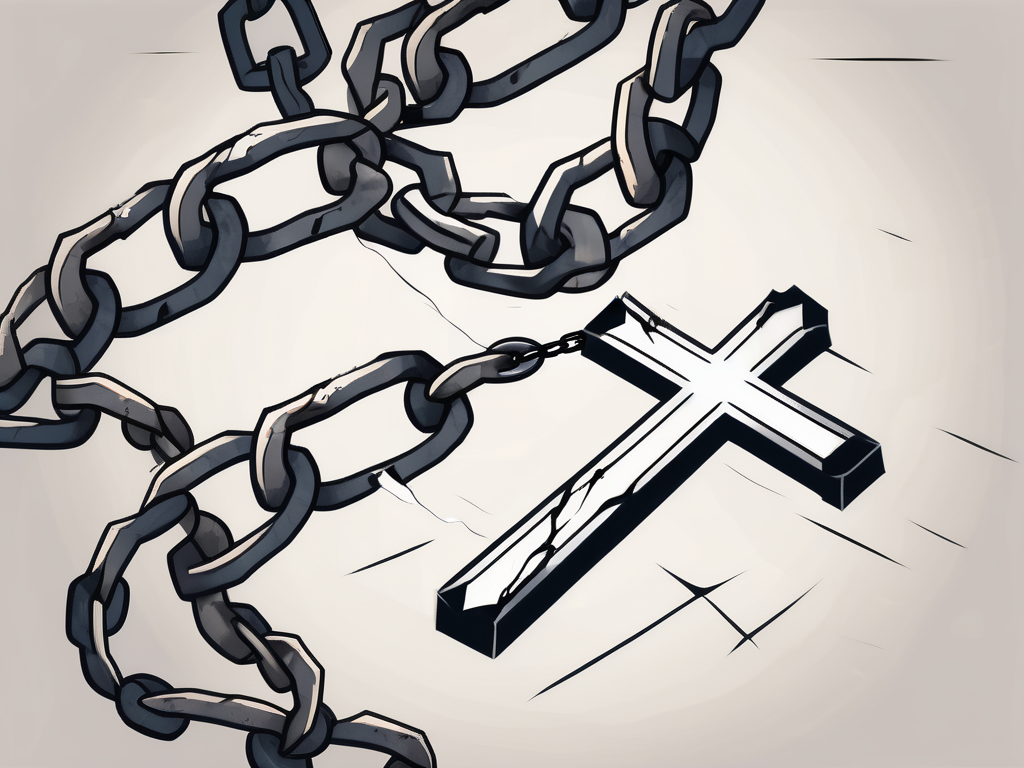Shame is a powerful emotion that can have a profound impact on our lives. It can make us feel unworthy, guilty, and isolated. In this article, we will explore the concept of shame from a biblical perspective and uncover the teachings and guidance the Bible offers to address this complex emotion.
Understanding the Concept of Shame in Biblical Context
Shame, from a biblical standpoint, is more than a feeling of embarrassment or regret. It goes deeper and originates from the inherent knowledge of right and wrong that God has instilled within us. It is a recognition of our sinfulness and the ways in which we fall short of God’s perfect standards.
Throughout the Bible, the concept of shame is intertwined with guilt and the consequences of disobedience. It is a consequence of sin and rebellion against God’s instructions. However, the Bible offers hope and redemption for those who experience shame.
Defining Shame from a Biblical Perspective
Shame, in the biblical sense, is more than just a negative emotion. It is a recognition of our brokenness and the need for God’s grace and forgiveness. It is a humbling experience that can lead to repentance and restoration.
When we experience shame, it is essential to remember that God’s love is not based on our performance but on His unchanging character. He invites us to bring our shame before Him and experience His healing and restoration.
The Origin of Shame in the Bible
The Bible traces the origin of shame back to the garden of Eden when Adam and Eve disobeyed God’s command and ate from the forbidden tree. Their eyes were opened, and they felt shame for the first time, realizing their nakedness and hiding from God’s presence.
Shame entered the world because of sin, and it continues to impact humanity to this day. However, the story of Adam and Eve also reveals God’s grace and His provision of covering for their shame, foreshadowing the ultimate redemption through Jesus Christ.
As we delve deeper into the concept of shame in the Bible, it is important to understand the multifaceted nature of this emotion. Shame not only affects individuals but also has societal implications. In biblical times, shame was not only a personal experience but also a means of social control.
In ancient Israel, shame was often used as a tool to enforce social norms and maintain order within the community. Those who violated the moral and ethical standards set forth by God were subjected to public shame, which served as a deterrent for others. This public shaming aimed to preserve the integrity of the community and reinforce the importance of obedience to God’s commandments.
However, it is crucial to distinguish between healthy shame and toxic shame. Healthy shame, rooted in a biblical understanding, leads individuals to acknowledge their wrongdoing and seek forgiveness and restoration. It prompts them to turn to God and receive His grace and mercy.
On the other hand, toxic shame is a destructive force that paralyzes individuals, preventing them from experiencing God’s love and forgiveness. It distorts their self-perception and hinders their ability to form healthy relationships. Toxic shame often stems from unresolved guilt and a distorted understanding of God’s character.
Thankfully, the Bible offers a remedy for shame. It teaches us that through the sacrifice of Jesus Christ, we can find redemption and freedom from the bondage of shame. Jesus, who bore our sins on the cross, invites us to lay our shame at His feet and receive His forgiveness and healing.
Moreover, the biblical narrative is replete with stories of individuals who experienced shame but found restoration and purpose in God’s redeeming love. Take, for example, the story of Peter, who denied Jesus three times out of fear and shame. Despite his failure, Jesus restored Peter and entrusted him with the responsibility of shepherding His flock.
These stories remind us that shame does not have the final say in our lives. God’s grace is greater than our shame, and He is always ready to extend His hand of forgiveness and restoration. As we navigate the complexities of shame, let us remember that our identity is not defined by our past mistakes but by the love and grace of our Heavenly Father.
Biblical Characters Who Experienced Shame
The Bible is filled with accounts of individuals who faced shame and wrestled with its consequences. Their stories serve as lessons for us today, reminding us of the consequences of sin and the power of redemption.
Adam and Eve’s Encounter with Shame
Adam and Eve’s disobedience in the garden of Eden brought about shame, leading them to hide from God. Their story highlights the devastating consequences of sin and serves as a reminder of the importance of obedience to God’s commands.
When Adam and Eve ate the forbidden fruit, they immediately felt a deep sense of shame. They realized that they had disobeyed God’s clear command and had allowed their own desires to lead them astray. Their shame was not just a feeling of guilt, but also a recognition of their nakedness and vulnerability.
As they heard God walking in the garden, Adam and Eve hid among the trees, desperately trying to cover their shame. Their attempt to sew fig leaves together as makeshift clothing was a feeble effort to hide their guilt and shame from the all-knowing God.
Despite their shame, God did not abandon Adam and Eve. He sought them out, provided for them, and promised a future redemption through the coming of the Messiah. In His mercy, God made garments of skin for them, symbolizing the covering of their shame and pointing to the ultimate sacrifice that would be made to redeem humanity.
David’s Shame and Redemption
David, known as a man after God’s own heart, also experienced shame. His affair with Bathsheba and the subsequent murder of her husband, Uriah, brought tremendous shame upon him.
David’s story is a cautionary tale of the dangers of lust and the devastating consequences of giving in to temptation. As the king of Israel, David had everything he could ever want, but his desire for Bathsheba led him down a path of sin and shame.
When confronted by the prophet Nathan, David’s shame was exposed for all to see. He realized the gravity of his actions and the pain he had caused not only to Uriah and Bathsheba but also to his own family and his relationship with God.
However, David’s story is also one of redemption. When confronted with his sin, he repented and sought God’s forgiveness. He wrote the heartfelt psalm of repentance, Psalm 51, pouring out his remorse and pleading for God’s mercy.
Though he faced the consequences of his actions, including the death of his child, God forgave David and continued to use him for His purposes. David’s shame became a catalyst for spiritual growth and a deeper understanding of God’s grace and forgiveness.
These stories of Adam, Eve, and David remind us that shame is a consequence of sin, but it does not have to define us. Through repentance and seeking God’s forgiveness, we can find redemption and restoration. The Bible teaches us that no matter how great our shame, God’s love and mercy are greater, offering us a chance to start anew and live a life of obedience and righteousness.
The Bible’s Teachings on Dealing with Shame
Shame is a complex and deeply ingrained emotion that can have a profound impact on our lives. It can stem from a variety of sources, such as past mistakes, societal expectations, or personal insecurities. However, the Bible offers guidance and principles for dealing with this powerful emotion, providing hope and a way out of shame through forgiveness and healing.
One of the first steps in overcoming shame is to acknowledge our sinfulness and offer it to God. The Bible assures us that if we confess our sins, God is faithful and just to forgive us and cleanse us from all unrighteousness. This act of confession is not meant to shame us further, but rather to bring us closer to God and allow His forgiveness to wash over us.
God’s forgiveness is not based on our merit or worthiness, but on His grace. It is through His sacrifice on the cross that we can find healing and freedom from shame. The Bible reminds us that Jesus bore our shame and guilt on the cross, taking the weight of our sins upon Himself. This act of selfless love offers us the opportunity to be set free from the chains of shame and experience the transformative power of God’s forgiveness.
Seeking Forgiveness and Healing from Shame
When we approach God with a repentant heart, seeking forgiveness for our sins, we open ourselves up to His healing and restoration. The Bible tells us that God is near to the brokenhearted and saves those who are crushed in spirit. He longs to bring healing to our wounded souls and replace our shame with His grace.
As we embark on this journey of healing, it is important to remember that it is not a one-time event but a process. Healing from shame requires patience, self-compassion, and a willingness to surrender our pain to God. It may involve seeking professional help, joining a support group, or engaging in therapeutic practices that promote emotional well-being.
The Role of Grace in Overcoming Shame
God’s grace is a powerful antidote to shame. It is the unmerited favor of God that allows us to come into His presence, despite our mistakes and failures. When we fully grasp the depth of God’s grace, shame loses its power over us. We can find comfort in knowing that God’s love and acceptance are not dependent on our performance or ability to meet societal expectations, but on His unwavering love for us.
Understanding and embracing God’s grace enables us to extend the same grace to ourselves and others. It reminds us that we are all imperfect beings in need of God’s mercy and compassion. By cultivating a mindset of grace, we can create a safe and nurturing environment where shame is replaced with love, acceptance, and forgiveness.
In conclusion, the Bible offers a roadmap for dealing with shame, providing us with the tools and principles necessary to overcome this powerful emotion. Through seeking forgiveness and healing, and embracing God’s grace, we can find freedom from shame and experience the transformative power of God’s love in our lives.
Shame and the Christian Life
Shame can profoundly impact our faith and spirituality. It can make us feel unworthy of God’s love and hinder our relationship with Him. However, the Bible assures us that shame does not have the final say in our lives.
The Impact of Shame on Faith and Spirituality
Shame can create barriers between us and God. It can leave us feeling distant and inadequate in our spiritual journey. However, it is crucial to remember that God’s love for us is unfailing and unchanging.
Even in our moments of shame, we can turn to God, seek His forgiveness, and find solace in His presence. He desires to restore and renew our faith, transforming our shame into a testimony of His grace.
Transforming Shame into Strength
When we surrender our shame to God, He can transform it into strength. Our experiences of shame can become powerful testimonies of God’s redemption and grace, offering hope to others who are also wrestling with shame.
As we walk through the journey of healing, we can develop empathy and compassion for others who are experiencing shame. We can become agents of God’s grace, sharing His love and acceptance with those who feel defeated by shame.
The Bible’s Guidance on Shame
Throughout its pages, the Bible provides numerous Scriptures addressing shame and offering guidance on how to navigate this complex emotion. These verses serve as a source of encouragement and a reminder of God’s faithfulness.
Scriptures Addressing Shame
One such verse is found in Romans 8:1, which states, “There is therefore now no condemnation for those who are in Christ Jesus.” This powerful verse reminds us that through Jesus’ sacrifice, we are no longer defined by our shame. Instead, we are embraced by God’s unconditional love and acceptance.
Other verses such as Psalm 34:5 and Isaiah 61:7 emphasize God’s desire to restore our honor and turn our shame into joy and double portion blessings.
Biblical Principles for Living Shame-Free
The Bible offers practical principles for living shame-free. It encourages us to renew our minds with God’s truth and to surround ourselves with a community of believers who can provide support and encouragement.
By meditating on Scripture, spending time in prayer, and seeking a deeper relationship with God, we can gradually overcome the grip of shame and embrace the freedom and joy that comes from knowing who we are in Christ.
In conclusion, the Bible acknowledges the reality of shame and provides teachings and guidance on how to address this complex emotion. Through the stories of biblical characters, we see the consequences of shame and the power of redemption. The Bible shows us that shame does not have the final say in our lives. By seeking God’s forgiveness, embracing His grace, and living according to His principles, we can overcome shame and walk in the freedom and joy that come from a restored relationship with Him.












